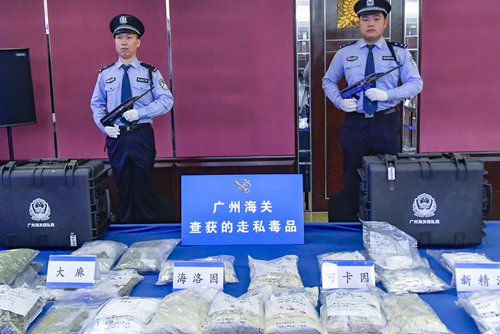Drug-related crimes on the decline in China with zero tolerance for smuggling
By Wang Qi Source:Global Times Published: 2020/6/23 21:43:40

Guangzhou customs authorities hold a press conference to brief the media on drug smuggling cases in the third quarter of 2018. Photo: IC
As the International Day against Drug Abuse and Illicit Trafficking approaches, which falls on Friday, China's Supreme People's Court on Tuesday released 10 typical cases of drug-related crimes and drug-induced secondary crimes concluded since 2019, including three death penalty cases.
Among the 10 representative cases there are cases of drugs productions and trafficking, governmental official's drug-related crimes, abetting youth drug use, children-murdering by people with a long history of drug use. Most of the 10 cases took place in East and South China, with four that occurred at Guangdong and Yunnan provinces.
"China's anti-drug campaign is still grim and complex," Li Shaoping, vice president of the Supreme People's Court and also vice head of China National Narcotics Control Committee, said on Tuesday, after the Supreme People's Court's data shows that the number of drug-related crimes has been on a downward trend, dropping to 85,800 in 2019, a 38.27 percent decrease from 2015.
Regarding challenges, Yang noted drug trafficking from the "Golden Triangle" is increasing, putting China's border regions like Yunnan and Guangxi under great pressure.
The spread of domestic drug production, the emergence of new synthetic drugs, and the use of high technology by drug traffickers also makes it harder to monitor and crack down illegal activities, Yang noted.
The people's courts in China have always adhered to strictly punishing drug-related crimes. The Supreme People's Court's data shows that regarding the drug-related crimes from 2015 to 2019, the average annual severe sentence rate of five years of imprisonment or more was 22.37 percent, which was significantly higher than that of all criminal cases in the same period.The drug-related criminals, whose crimes are extremely serious, highly subjective and vicious, and whose criminal evidence is sufficient, shall be sentenced to death in accordance with the law.
Australian national Karm Gilespie was sentenced to death for drug smuggling at the first trial by a court in Guangzhou on June 10. Gilespie was found to be carrying more than 7.5 kilograms of methamphetamine in his luggage at Guangzhou Baiyun International Airport in 2013.
Australian media has linked the case with the worsening China-Australia ties while analysts said China's strict law is equal to every violator, whether he is Chinese or foreigner, and it is ridiculous to link legal penalty with so-called political manipulation.
According to Chinese criminal law, the highest punishment for criminals who smuggle more than 50 grams of meth could be the death penalty.
China's improvement in anti-drug actions mainly comes from the endeavor on monitoring, Qu Jiuxin, the director of Institute of Criminal Law under China University of Political Science and Law, told the Global Times on Tuesday.
Qu said the real-name registering system, monitoring at costumes and on logistics are crucial to rebuff further drug crime. The indirect supervision and punishment mechanism formed in Chinese society, such as sacking a gowster in a company, also plays an important part. "The society and credit system almost give no tolerance to drug crimes, which have great harm to individuals, families and society."
Early this month, Shanghai police announced that they had arrested a celebrity for taking drugs and allowing others to do so. With the stage name of Com, the talk show host has about 750,000 followers on Sina Weibo, but many fans have cut off ties with him after he was arrested. Com's company cut the ties with him afterwards as well.
China's criminal law is basically complete in terms of drug-related crimes, with complete rules of evidence and procedures. China also cooperates with neighbors to fight transnational drug crimes under guiding rules of the United Nations, said Qu.
China formally promulgated and implemented the narcotics control law in June 2008, which Qu believes is China's contribution to the world and a guarantee of human rights for drug users.
Dong Guang, an experienced drug control official and head of bjjdzx.org, a website affiliated with Beijing's anti-drug office, told the Global Times on Tuesday that fundamentally speaking, publicity and education are the most important part of drug crime prevention.
"The drug problem will be with mankind for a long time to come… drug crimes happen all the time and it's not enough to only call for anti-drug in June," Dong said.